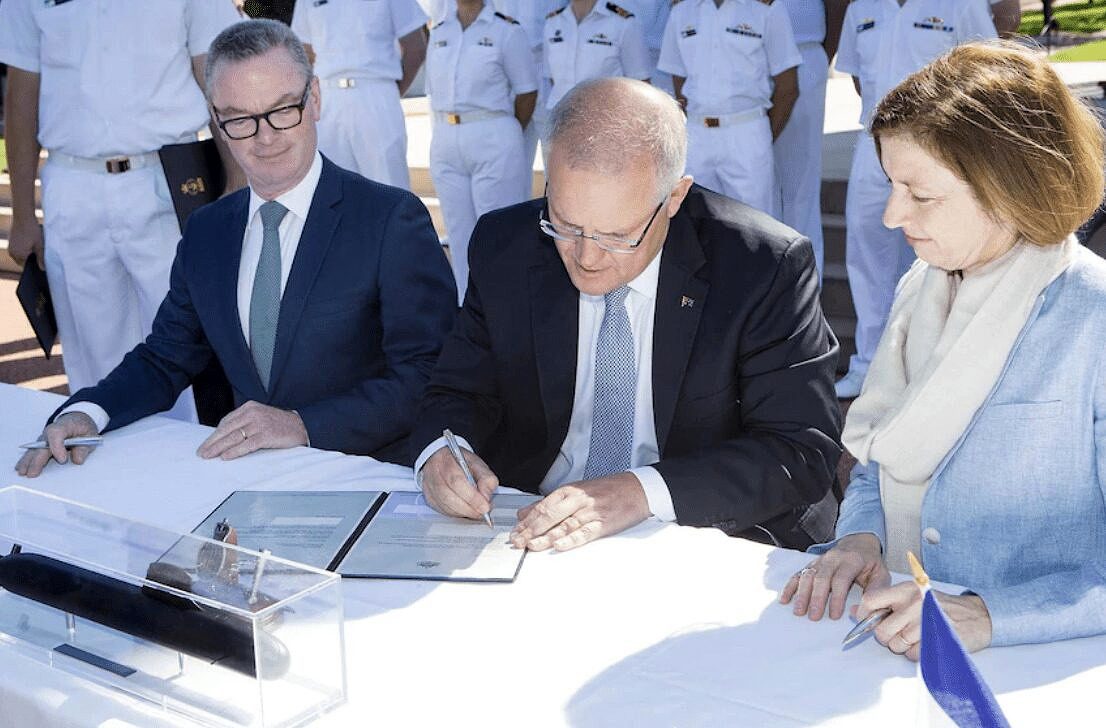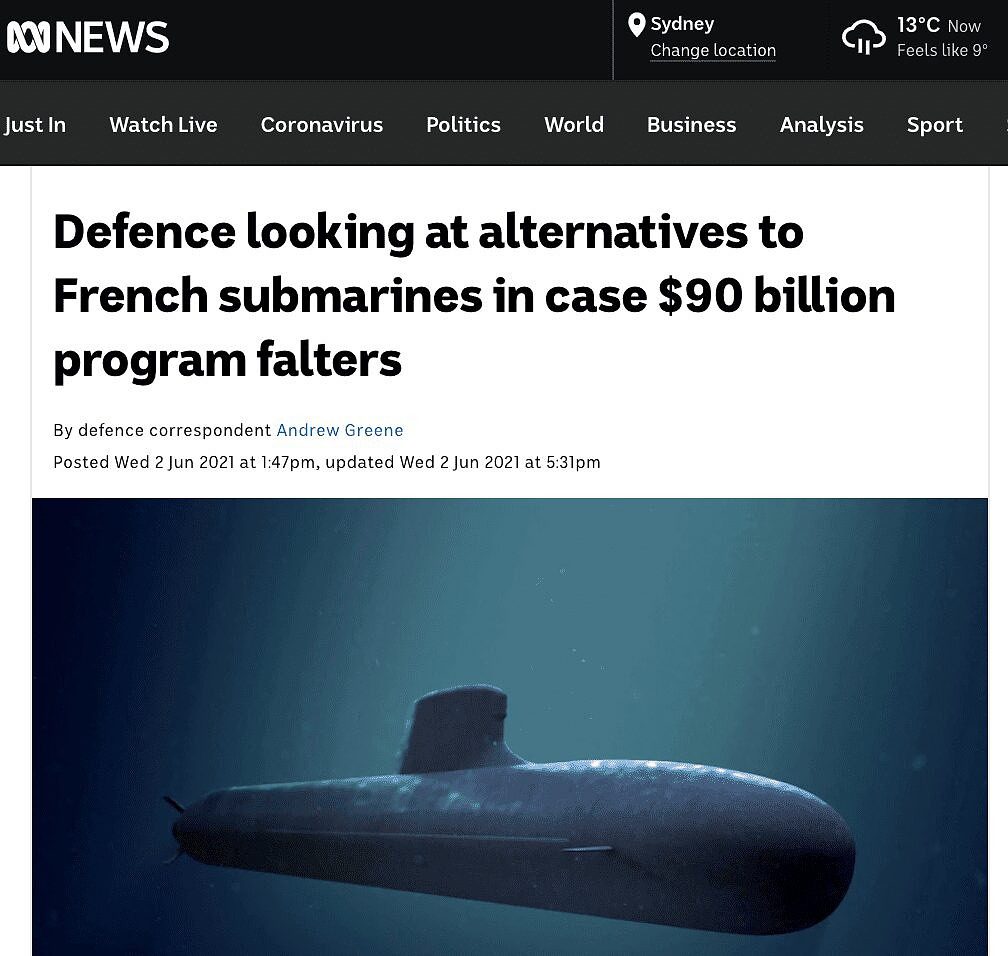Appreciate our quality journalism? Please donate here
EXCLUSIVE
Prime Minister Scott Morrison’s “naive” decision to keep France in the dark and abruptly “tear up” the $90 billion France submarine deal – rather than follow standard contract protocols – will cost Australian taxpayers dearly, says a key member of the Senate inquiry into the program.
Independent Senator Rex Patrick, a submariner and defence industry expert, said the French Government’s Naval Group had been many months behind schedule and had repeatedly missed key contractual milestones.
That meant Australia had been fully entitled to exit the contract “on the basis of non-performance”, and so minimising costs to taxpayers.
Instead, Morrison’s explosive September 16 move, which blindsided France, means Australia has exercised a “termination for convenience” clause – in a move which is expected to cost Australia hundreds of millions of dollars more in additional fees, charges and penalties.
Termination for convenience clauses are common in construction contracts, however they are infrequently used because they expose the terminating party to large costs and damages.
Morrison’s decision to sensationally blind-side France, rather than exit the deal contractually over ongoing delivery failures, is set to be heavily exploited by Naval Group which has indicated it will aggressively pursue compensation.
“The Prime Minister went into this project naively and he’s also exited it naively,” Patrick told The Klaxon.
“Naval Group will be rewarded in circumstances where they were not performing to the contracted schedule”.
Patrick, who is a member of the ongoing Senate inquiry into Australia’s naval shipbuilding capacity, has welcomed the scrapping of the French deal, of which he has been a vocal critic, but has serious concerns over how it was done.
“Morrison was naive for going into this contract because it was hugely risky,” Patrick said.
“He did so on the advice of admirals, that have limited project management experience, advising a cabinet, who has none.”

Prime Minister Scott Morrison signing the Strategic Partnership Agreement with Naval Group in February 2019. Source: Department of Defence
There was no legitimate reason for Morrison not to have exited the French agreement under normal “non-performance” criteria, given it had repeatedly missed key milestones, putting Naval in breach of contact.
“He (Morrison) could simply have secured the (AUKUS) arrangement” and then started down the path of exiting the (French) contract,” Patrick said.
“When you commence those sort of exiting arrangements, that doesn’t have to be instantaneous.”
““When you commence those sort of exiting arrangements, that doesn’t have to be instantaneous””
— Senator Rex Patrick
These were details the government “will have known but basically not cared about”, Patrick said.
“It’s always just taxpayers’ money”.
Naval Group is yet to send a bill to Australia, but on Wednesday the French defence giant signalled Morrison having terminated the deal under the “convenience” clause would be a key plank in its damages and penalties claim.
“The Australian authorities terminated the contract out of convenience, recognising that Naval Group has not failed in its commitment,” Naval Group said.
“The consequences of terminating the contract for convenience are addressed in the Strategic Partnering Agreement (SPA) signed in 2019.”
While Australia announced the deal with Naval Group in 2016, the Strategic Partnering Agreement, the document underpinning the entire deal, was only signed in February 2019, by Prime Minister Morrison.
The Strategic Partnering Agreement contains “break payments”, which stipulate fees Australia must pay certain fees if it terminates the deal prematurely.
If Australia exited after Naval Group had completed the “basic design”, Naval was to receive a “break payment” of 90m euros ($144m). That payment grew to 250m euros ($400m) if Australia was to exit the project after Naval Group had already delivered the “detailed submarine design”.
At September 16, Naval had completed the basic design but had not yet delivered the detailed submarine design, which was still many months away.
Patrick said that had Australia exited the agreement on grounds of non-performance, it was unlikely Australia would have been forced to pay any “break fee” to exit the deal.
Now, Australian taxpayers would not only be paying, at the very least, $144m in specific “break fees” – given the “basic design” of the submarines had been completed – but far more in additional fees and penalties.
“They will go for absolutely everything,” a defence industry contracting expert told The Klaxon.
“Every little bit of work they have started they will be billing for – the bill will be huge”.
Australia could have easily begun processes to exit the project for non-performance before announcing the AUKUS tie-up, the source said.
On the morning of September 16 Morrison announced Australia planned to obtain eight nuclear submarines with assistance from the US and UK, under a new alliance between the countries, called AUKUS.
It subsequently emerged that Morrison did not speak with Emmanuel Macron before the announcement, instead sending the French President a text message the night before.
Morrison and his office did not respond to a series of questions from The Klaxon, including why the Prime Minister had opted to abruptly terminate the French deal, and so triggering an “termination of convenience”, rather than exiting the contract for “non-performance” given France’s ongoing failures.
Morrison’s office provided transcripts of interviews the Prime Minister had previously given on the matter, however in them Morrison does not significantly address the central questions.
Federal ministers Simon Birmingham and Dan Tehan have publicly defended Morrisons’ move, claiming “secrecy” was necessary, yet both have failed to sufficiently explain the Prime Minister’s actions.

One of many media reports highlighting the submarine deal was on the rocks, months before the AUKUS announcement. Source: ABC
Birmingham and Tehan also declined to respond to questions from The Klaxon, with their offices pointing us to earlier public statements the men had made on the issue.
Those statements also fail to adequately address the central question of why Morrison exited the Naval contract in the manner he did.
That Australia’s program with Naval Group, to deliver 12 diesel-electric submarines from 2035, was under serious pressure, behind schedule and in danger of being scrapped, was no secret.
In January 2020 the Auditor-General published a report showing that as early as mid-2018 experts engaged by the Federal Government had warned the Australian Department of Defence it should be considering a “Plan B”.
An emergency visit to Australia in February this year by Naval Group CEO Eric Pommellet, aimed at getting the project back on track, had failed and he returned to France empty-handed.
At the time, responding to media reports that Australia was considering walking away from the project, Finance Minister Birmingham told ABC Radio it was “always prudent to look at contingencies” and to “know what your options are and to be prepared for them in any eventuality”.
Morrison was intimately involved in the submarines deal.
In March the ABC revealed the Prime Minister had abolished the National Shipbuilding Advisory Board and created a “powerful” new sub-committee and appointed himself as chair.
Morrison’s new National Shipbuilding Enterprise Governance Committee was to “ensure the naval shipbuilding enterprise and each component is on track,” the Federal Government said.
France has repeatedly accused Australia of lying over its intentions to scrap the deal.
Naval Group and French officials have pointed to a September 15 letter – the day before Morrison’s announcement – from Australia’s Department of Defence.
This week French Foreign Minister Jean-Yves Le Drian told a parliamentary inquiry that “some one lied”.
“Everything I have told you is confirmed by the letter I received on 15 September from the Australian ministry of defence that said everything is OK let’s continue,” he said.
“Something doesn’t add up and we don’t know what.”
Defence industry sources with intimate knowledge of the project tell The Klaxon that the Department of Defence – the people dealing with Naval Group on the project – had also been kept in the dark about the impending AUKUS announcement.
Rather than being an official approval for the submarine project to move into the next stage (which required ministerial sign off), the September 15 letter was a certification that Naval Group had passed its latest audit, or performance milestone, albeit around nine months late.
Delivery of the submarine project was being handled by Defence’s Capability Acquisition and Sustainment Group (CASG), which is responsible for supplying Australia’s “military equipment and supply requirements”.
“CASG didn’t know this was coming,” said the source.
Instead it had been a secret among a very small group of senior government officials, including Morrison and Defence Minister Peter Dutton.
Help us get the truth out from as little as $10/month.
Unleash the excitement of playing your favorite casino games from the comfort of your own home or on the go. With real money online casinos in South Africa, the possibilities are endless. Whether you’re into classic slots, progressive jackpots, or live dealer games, you’ll find it all at your fingertips. Join the millions of players enjoying the thrill of real money gambling and see if today is your lucky day!
The need for fearless, independent media has never been greater. Journalism is on its knees – and the media landscape is riddled with vested interests. Please consider subscribing for as little as $10 a month to help us keep holding the powerful to account.






